Below you will find FCE (B2) Speaking Part 2 cards with sample answers and useful phrases. You can print them or save in PDF. To get better score, take a look at the FCE Speaking page.
Further recommended reading: FCE Speaking Part 2 Tips
Sample answers are in italics. Useful expressions are highlighted and explained at the end of each set.
#1. Living in different places; Exercising
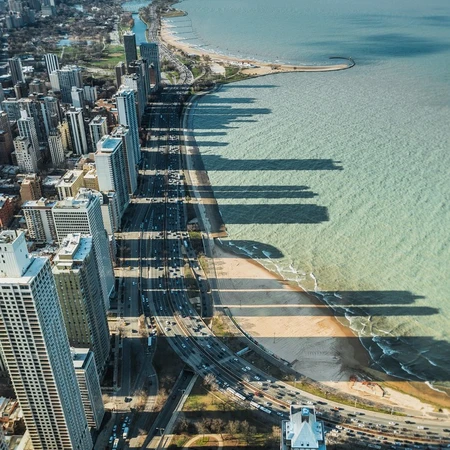

Candidate A, here are your photographs. They show various places where people live. I’d like you to compare the photographs and say why people might choose to live there, okay? (1 minute)
Candidate A: The left picture shows some large cityscape with a line of apartment blocks built right next to the sea, while in the picture on the right we can see a peaceful village next to a train station and a train passing by. While both photos have various types of housing in them, the right one looks much more quiet than the other.
I believe that people who choose to live in a busy city do so because they lead a more active lifestyle – they commute to work, go to parties, restaurants, exhibitions—all the activities a big city has to offer. In contrast, those who reside in a remote place like in picture two, prefer a more relaxed, slower pace of life.
Candidate B, which place would you prefer to live in, and why? (~20 seconds).
Candidate B: Personally, I’d go with the quiet place next to the train station. I could commute to the city centre by train, take morning strolls in the woods, and generally enjoy all things natural. I don’t party that much and I’m not into eating out, so I won’t miss out on most things a busy city is so loved for.
Commute (v) – to travel the same route several times a day, usually as a part of going to your place of work or study and coming back to where you live.
Reside (v) – to live somewhere, to have something as your place of residence.
Go with – if you go with something, it means you choose it among other things. In FCE Speaking Part 2 you will often face a question with the examiner asking for your preference on some topic.
Take a stroll – to go for a walk, either as a form of exercise or just for leisure.
To be into something – to be interested in something.
Miss out on something – not to get something or take part in something that is valuable or desirable.

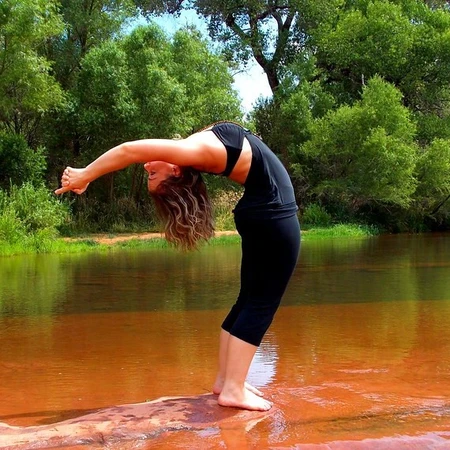
Candidate B, now it’s your turn. These pictures show people exercising. Compare the photographs and say how the exercising might make people feel. (1 minute)
Candidate B: The right photo shows a girl on a river bank doing what looks like gymnastics, while in the left picture, a lady is in the middle of a tennis match. Both do some kind of sports activity, however, one is performed outside while the other seems to be taking place indoors. Moreover, tennis requires special equipment, such as a racket, while the other exercise doesn’t need anything at all.
I guess both people pictured here feel content with what they’re doing, as exercising energises you, and if you spend enough time at it, you will feel pleasantly exhausted. It is also beneficial for your brain, letting your mind wander.
Candidate A, which type of exercise would you prefer, and why?
Candidate A: Even though I’m not very good at tennis, I would have to choose it over the activity in the other picture – I’m hopeless when it comes to body balance! Tennis is a nice combination of physical exercising and thinking, since you don’t simply chase the ball. Instead, you have to calculate your hits and plan ahead. I like this aspect of tennis very much.
Seems to be taking place – one notable thing here is the verb ‘seems’ – a way to show uncertainty or speculation – an aspect that is common in Part 2 of FCE Speaking.
Pictured (adj) – one of the many useful paraphrases used in describing pictures.
Would have to choose – a structure that can be used to express unwillingness, reluctance or a lack of desire to make a choice. Ultimately, it helps you express an additional shade of meaning.
Plan ahead – to plan well in advance, rather than make decisions spontaneously, on the spot.
#2. Different types of work; Places for holidays


Candidate A, here are the two pictures. They show people doing different jobs. I’d like you to compare the two pictures and say what difficulties the people might have when doing their jobs. (1 minute)
Candidate A: Both pictures here show people at work, but the nature of their activities is very different. The lady in the picture on the left is facing a difficult creative task, judging by her body language and the blank sheet of paper. In contrast, the man in the second photo does a very physically demanding job at something that looks like a construction site.
While the man’s job is fairly straightforward, it can be very dangerous to his health and well-being. The woman’s task here seems to be rather tricky, as she appears to be stuck with the task. Undeniably, both jobs can be very stressful.
Candidate B, which job do you think is more difficult? (~20 seconds).
Candidate B: I think the duties shown in picture two are much more challenging. Sure, creativity is not necessarily easy, but physical and manual labour are always a struggle. No matter how good you are at it, you have to perform very tiring, repetitive actions that are both mentally and physically taxing.
Face a difficult task – a useful collocation to describe a person struggling with something. Note the Present Continuous form that is required for picture description.
Judging by something – yet another one of the many phrases to introduce a guess, to show uncertainty.
That looks like … – see previous entry. Keep in mind that even though these structures might seem simple, at the exam it is important to display flexibility of language and, if possible, avoid repetition.
Undeniably (adv) – without a doubt. Use this to show that you are sure about something.
Taxing (adj) – if something is mentally or physically taxing, doing it takes a toll on your mind or body, respectively.

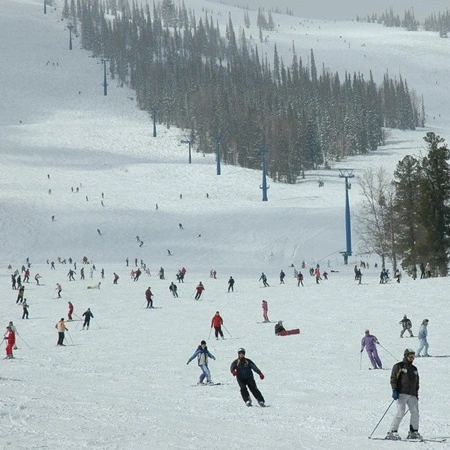
Candidate B, now it’s your turn. The pictures show different holiday locations. Compare them and say why people might choose to spend their holiday in each place. (1 minute)
Candidate B: Both pictures show us resorts of some kind. While the left picture looks warm and peaceful, the other is rather cold and even a bit dangerous. However, somehow both of them look equally cosy, though for different reasons.
People looking for a place to spend their holiday may prefer huts by the seaside, especially if they come from a colder country and want to experience a warmer, more pleasant climate. They are also likely to appreciate the local food, which is rich in fruits and vegetables. As for the second photo, it might be favoured by more active and young people, those really keen on sports and exercising.
Candidate A, which of the two places is better to spend a family holiday at? (~20 seconds)
Candidate B: The location shown in the first photo is definitely much better for a family with kids. Every member of the household can enjoy sunbathing and swimming, whereas some kids can be too young to try skiing. Also, the low temperatures of a ski resort may not be to some people’s liking.
May prefer – you will sometimes be asked about the reason for people’s choices in the picture – a structure like this will help you express your guesses.
Come from – note that the expression is not used literally here to mean that somebody originates from a particular place. Instead, it focuses on people’s background.
Favoured by – another expression to show what somebody likes, this time in a form of a passive structure. Showing grammatic flexibility in your answer will help you score higher.
Those – a way to avoid a word like ‘people’ when contextually it is clear what you mean, e.g. ‘Single men are usually less happy, while those who are married report to lead more fulfilling lifestyles’.
Member of the household – somebody belonging to a particular family. It can be either a member of the immediate or extended family.
Be to somebody’s liking – third phrase in this list that is used to express preferences.
#3. Eating; Business meetings
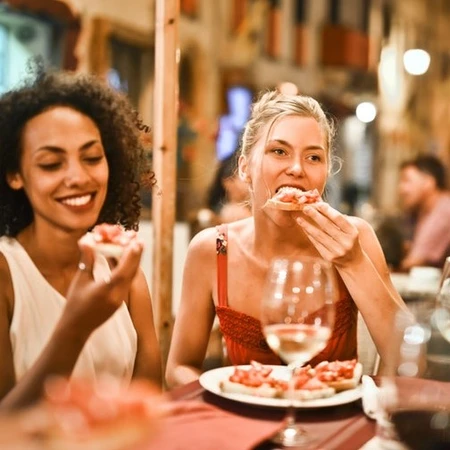

Candidate A, here are your pictures. They show people eating. I’d like you to compare these pictures and say who you think enjoys their meal most. (1 minute)
Candidate A: Picture one and picture two both show people having a meal. One of the places appears to be an expensive restaurant or café; the other looks like a regular apartment. In the left picture, the people are dressed up for the occasion, while the right photo shows us a person wearing very casual clothing.
I think that the girl in the right picture is savouring her food more – she hasn’t even put it on a plate; she is eating it right out of the frying pan. I guess she must be really hungry! The women in the photo on the left seem to be more preoccupied with the conversation than the food itself. In all likelihood, they came to the restaurant to meet each other rather than to eat.
Candidate B, how often do you eat out? (~20 seconds).
Candidate B: Almost never, I’m afraid. Eating out is rather expensive in my city. You also need to put on some fancy clothes – you know, because everybody else does and you don’t really want to stand out. When I do go out, it is usually a very special day that calls for a celebration – like somebody’s wedding or a graduation ceremony. It makes it even better – each time is really memorable!
Appears to be – a structure that shows speculation, when we are not certain about something.
Dress up for something – to put on more expensive, fancier clothing for a situation that calls for it.
Savour (v) – to truly enjoy something – can be used both literally, like with food, and figuratively, e.g. about some moment of time.
I guess she must be – a speculative structure. Guessing something is encouraged both in CAE and FCE Speaking Part 2.
Put on (phr v) – to wear something.
Everybody else does … – the interesting part here is that we omit the object, i.e. we don’t say ‘everybody else does it’.
Stand out (phr v) – if something or somebody stands out, they are easily noticeable because they are different.
Call for (phr v) – to require, to be fitting. ‘A serious situation like a forest fire calls for quick decisions’.
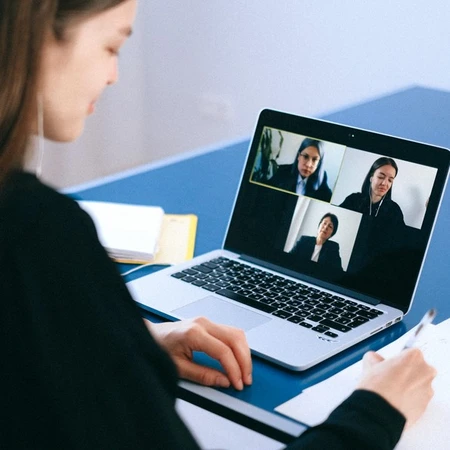

Candidate B, now it’s your turn. These two pictures show people in business meetings. Compare them and say how people in these meetings might feel. (1 minute)
Candidate B: In both of these photos, we can see people discussing things connected with business. The picture on the right shows a traditional, face-to-face way of communicating, where everybody is in the same room. However, the left photo presents a different way of getting in touch: using modern technology, such as video conferencing.
The person in the left photo likely feels a bit detached from the meeting as the people she’s talking to are not physically present. However, she probably appreciates the flexibility that online communication offers. As for the situation in picture two, the office workers there are likely to be much more comfortable, engaged in an old-fashioned business conversation in a meeting room.
Candidate A, which type of business meeting is more efficient? (~20 seconds)
Candidate A: Well, I would say that both ought to be pretty effective, as businesses across the globe use them. I hold it that having a meeting using video calls might be a better choice; you don’t have to spend time getting to the meeting, and it’s much easier to arrange, you know, to make sure everybody has free time. When every participant has to come to some place, it complicates things.
Get in touch – (here) communicating, reaching out.
Detached from – disinterested, uninvolved.
Appreciate (v) – to understand and respect the value of something.
I would say – a structure to introduce uncertainty.
Across the globe – everywhere, all over the planet.
Arrange (v) – to organise, to make something possible.
#4. Rush hour; Watching a movie
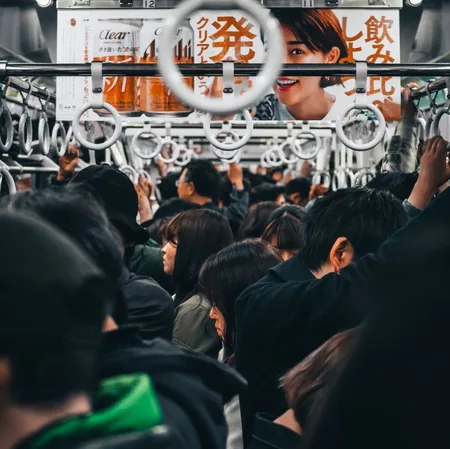
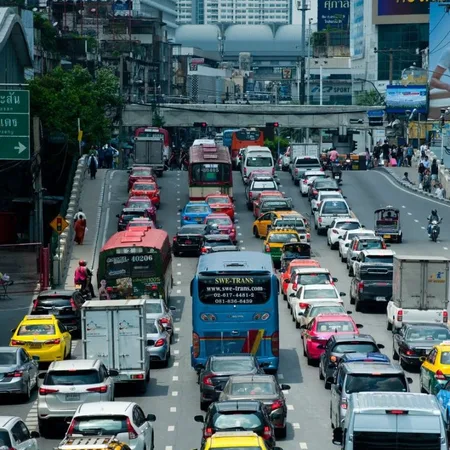
Candidate A, here are your pictures. In these pictures, you can see people commuting. I’d like you to compare the two pictures and say why they might have chosen to commute this way. (1 minute)
Candidate A: In both of these pictures, we see people on their way somewhere. It could be their job or the place where they study. However, there are differences that are easy to see at first glance. In the left photo, people have almost no personal space because it’s very crowded, so they have to stand really close to each other. In the right picture, on the contrary, most cars are private, and drivers as well as their passengers must be feeling more comfortable and safe.
Speaking of the reasons for their choice, I assume very few people actually have the luxury of choice when it comes to moving around the city. I think the vast majority of train passengers in the first picture would gladly commute by car if they could afford it. However, some of them might choose public transportation to save the environment and reduce their carbon footprint.
Candidate B, how do you usually commute? (~20 seconds).
Candidate B: I use my bike for most in-city journeys, but when it snows, I prefer to go by taxi or ask some friends to give me a lift. I’m not very keen on buses, as they take forever to get somewhere and are usually packed with people. I can walk too, if it’s not too far away, but it is never my first choice.
Easy to see at first glance – easily noticeable. Keep in mind that various descriptive phrases are of great use in FCE Speaking Part 2, so knowing many of them will help you display language flexibility.
Personal space – if somebody is standing close to you, e.g. in a small elevator, you have less personal space.
On the contrary – opposite from something else. Used to show contrast between pictures in this particular task.
Assume (v) – to guess, to say something, and to indicate that you do not know this for sure. A speculative verb.
Carbon footprint – the amount of CO (carbon monoxide) that you leave behind as a result of eating, buying things and so on. Basically, it is the amount of harm you do to the environment shown in numbers.
In-city journeys – moving within the city limits, as opposed travelling between cities.
Give a lift to somebody – to use your car to drive somebody to where they need to be.
Take forever – take an extremely long time.
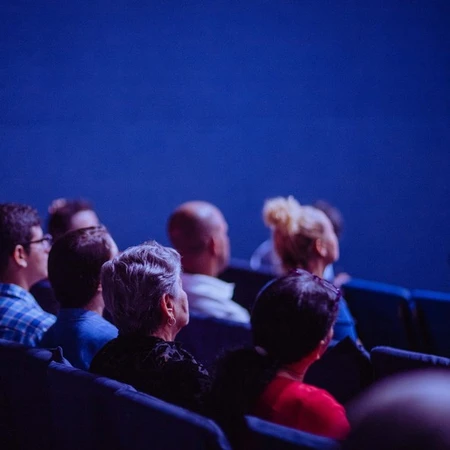

Candidate B, here are your pictures. They show people watching a movie. Compare the pictures and say what the benefits of watching movies in these ways are. (1 minute)
Candidate B: In both pictures, we can see people enjoying a film. One place appears to be a cinema theatre, and the other seems like an ordinary living room. The theatre seems to be half-empty, with some vacant seats in the first two rows.
I’d say that the advantages of watching a show from home are rather obvious: you don’t have to go anywhere, and there is no need to pay for the ticket. It’s so much more comfortable just to stay at home, grab your favourite snack, and put a nice flick on. However, movie theatres have their advantages as well: both the picture and the sound are much better, and you can really feel explosions, for example, if it is an action movie. So yeah, each situation is good in its own way.
Candidate A, is it better to enjoy a film on your own or with others? (~20 seconds)
Candidate A: If it is a mainstream movie, then I guess it’s much more fun to watch it with your friends. They say that sharing an experience makes it more enjoyable. And on the contrary, if the film is of a less popular genre, something like a documentary or another niche variety, then it would be much better to watch it on your own since not everyone is going to find it fun.
Have their advantages – a structure to focus on good (or bad, using ‘disadvantages’) points or aspects of something. In this part of FCE Speaking you might get asked a similar question.
Judging by something – yet another one of the many phrases to introduce a guess, to show uncertainty.
So yeah – an informal introductory phrase that can be used to summarise the points you have just mentioned. Remember that in the speaking part you are not strictly bound to one register, so feel free to mix formal and informal structure.
Mainstream (adj) – targeted at or meant for the majority of people.
Sharing an experience – if you share an experience with something, it means that you go through that event together.
#5. Shopping; Free time

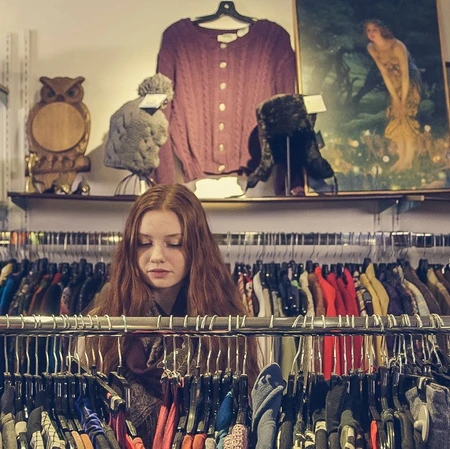
Candidate A, here are the two photos: they show people shopping. I’d like you to compare the photos and say which person is facing a more difficult choice. (1 minute)
Candidate A: In the left picture, a lady is in what looks like a very expensive shop. She is deciding on the particular style and colour of shoes to buy. The right photo shows us a teenage girl going through a rack of clothes in what seems to be a thrift shop. The main difference between the two settings is the amount of money the person is willing to spend; one is ready to pay extra for the brand and prestige, while the other probably wants to save money on the purchase.
The girl in the right picture is likely to have a more difficult time as she has to find something that suits her taste and won’t break the bank. The person in the right picture seems to find shopping to be yet another fun activity, a way to spend her time.
Candidate B, how often do you shop for clothes? (~20 seconds).
Candidate B: To tell the truth, I don’t do much shopping for things to wear. Our family is rather big with lots of brothers and cousins, so I usually get a lot of hand-me-downs — you know, things they no longer wear, so I get them instead. I actually like this arrangement; I get free stuff, and it makes them feel better — it’s a win-win situation for everybody!
Going through – in this context, it means to search for something among other things. Note the Present Continuous used here – a common practice when describing pictures.
Setting (n) – the word ‘setting’ here means a situation or an environment. A great synonym to include in your answer to avoid word repetition.
Probably (adv) – almost certainly or very likely.
Break the bank – an informal phrase that means to spend too much money on something. A similar expression is ‘to splash out on something’.
Hand-me-downs – things you get for free, usually from older brothers and sisters because they no longer use them.
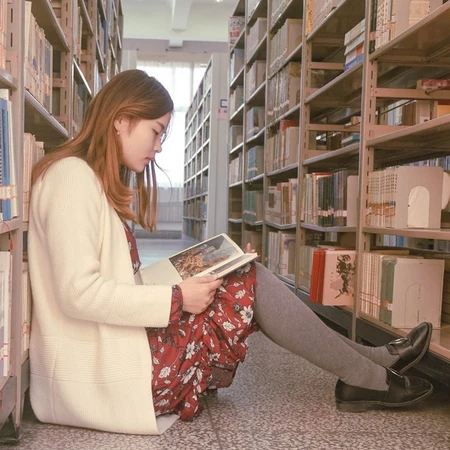
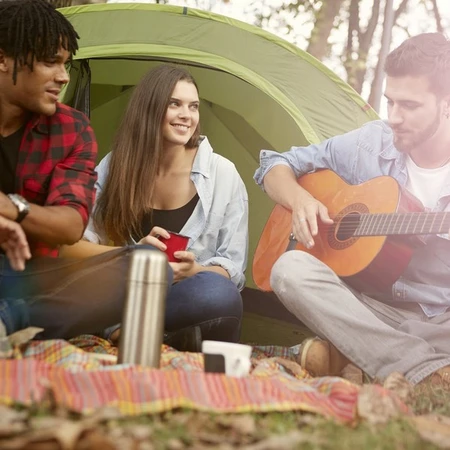
Candidate B, here are your pictures, which show people spending their free time. Compare the two pictures and say what are the advantages and disadvantages of spending your free time in these ways. (1 minute)
Candidate B: The two pictures show us people doing things they enjoy. The girl in the left picture seems like she prefers solitude; that’s probably why she is in a quiet library, sitting between bookstalls. In contrast, the group of friends from the second picture seem to be the outgoing and sociable type; they are camping somewhere in the woods.
I hold that the advantages of being on your own are not that many: you don’t depend on other people, and you don’t have to do something you might not like. The disadvantage is that sometimes you may feel lonely. As for the positive aspects of camping with friends, they are numerous. The fresh air and good company can be a nice change from your routine. I can’t really think of any disadvantages!
Candidate A, do you prefer spending free time alone or with others? (~20 seconds)
Candidate A: I’m the reclusive type. I don’t need people around me all the time to feel comfortable. Whether it’s reading, long walks in a park or even travelling, I’m in my element when I’m on my own. I don’t mind being with friends occasionally, but I don’t feel like spending too much time with others.
Type (n) – in this context, you use the word to mean something like ‘kind’.
I hold that – I believe that, I am of the opinion that.
A nice change – some kind of variety, a thing or activity that is different from what you are used to. Obviously, used positively.
Reclusive (adj) – preferring to be alone, on their own.
In my element – if you are in your element, then you find the environment or the activity enjoyable, like you belong there or if it is meant for you to do or be in.
#6. Shopping for food; Kids with bikes


Candidate A, here are your pictures. They show people shopping for food. I’d like you to compare these two photos and say what they might find enjoyable while doing their shopping. (1 minute)
Candidate A: While in the left picture we can see people making purchases in a supermarket, the right picture shows people buying food from a street vendor. The place in the first photo looks like it has a wider variety of goods, but the food in the other picture is more likely to be fresh and natural.
I believe that the family in the supermarket enjoys doing it together, taking everyone’s opinion into account. They look really happy. The people in the right picture are glad to have the opportunity to purchase fresh produce. The buyer and the street vendor are likely to know each other, too.
Candidate B, Which type of shopping is more common in your country? (~20 seconds).
Candidate B: I can’t say that either of these types is more popular than the other. It really depends on the part of the country. Smaller towns and villages tend to have many outdoor markets where you can buy fresh, natural food. In bigger cities, people mostly shop in supermarkets.
Street vendor – a person who sells things like food outside rather than indoors.
Taking everyone’s opinion into account – considering or paying attention to their opinions.
Fresh produce – the word ‘produce’ (with the first syllable stressed: produce) here means food, especially fruits and vegetables.
Outdoor markets – see street vendors, but this time it involves many stalls in one place. Markets like this are more organised and are usually found at the same place, whereas street vendors might move from one location to another.
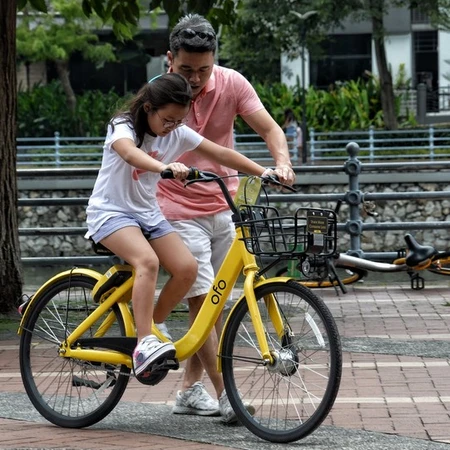
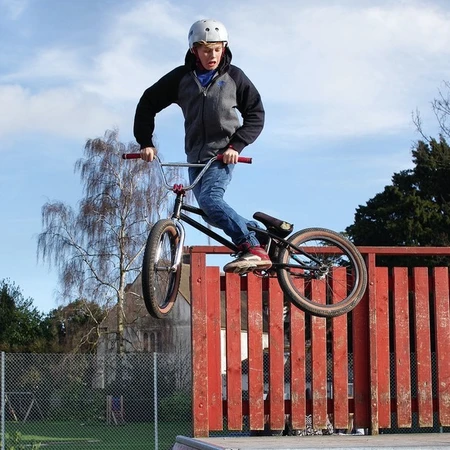
Candidate B, here are your pictures. They show young people on bicycles. Compare the pictures and say what challenges they might be facing. (1 minute)
Candidate B: Well, the little girl in the left picture is being taught how to ride a bike by her father. In contrast, the boy in the right picture looks really confident on his BMX bicycle, performing a stunt jump. I guess both of them are enjoying the experience, but for different reasons.
The girl seems to be feeling nervous as she has steer the bike, maintain balance, and be aware of her surroundings – all at the same time! It must be really difficult to do all that when you’re just a beginner cyclist. This can’t be said about the boy, whose challenge is quite different — he has to land his bike safely without breaking it or hurting himself.
Candidate A, is cycling popular where you live? (~20 seconds)
Candidate A: No, not at all. We have harsh winters with lots of snow, and our summers are really short. You can see an occasional cyclist, but it is more of an exception. It’s a shame, really. I wish we had a warmer climate, because cycling really looks like a fun thing to do!
This can’t be said – this is not true, this is not the case.
Not at all – a more emphatic negative structure, more interesting than the usual ‘no’ or ‘not really’.
Harsh winters – winters that see lower temperatures, stronger winds and snowfalls.
It’s a shame – a set expression to show your disapproval of a situation.
#7. Manual work; Cooking
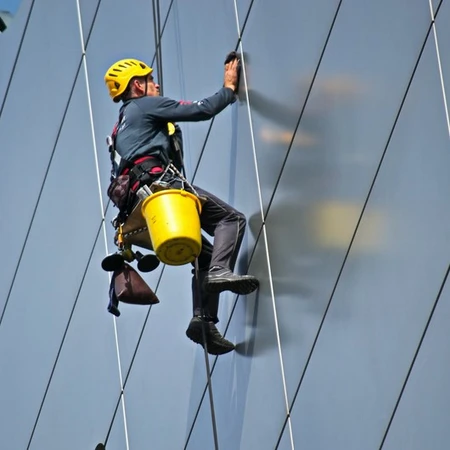
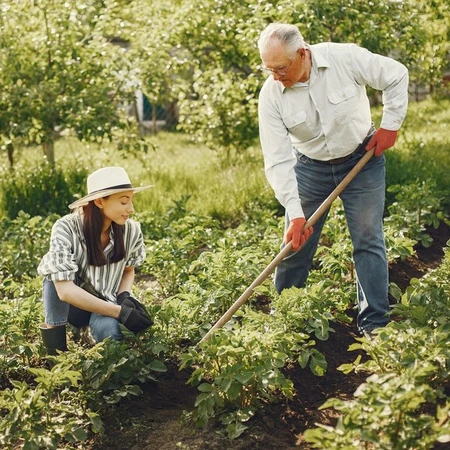
Candidate A, here are your pictures. They show people working. I’d like you to compare the photos and say why they might have chosen to do this work. (1 minute)
Candidate A: The man in the right picture seems to be hanging from a high-rise building, cleaning windows; this looks a bit scary, to be honest. On the contrary, the left image depicts an old man, probably the father of the young girl next to him. They are tending to their crops — a much more peaceful picture, if you ask me!
The man cleaning the windows could have chosen that activity to make money because it looks rather dangerous, or maybe he is really into doing risky things, you know, for adrenaline. The people in the right photo might be looking after the crops because they depend on them, or it could be just their hobby; it’s hard to tell.
Candidate B, which person finds their activity more satisfying? (~20 seconds).
Candidate B: I can’t really imagine finding satisfaction in hanging high above the ground, cleaning somebody’s windows. I mean no offense to the person, somebody ought to do that, but this doesn’t seem like an activity one would feel satisfied with. That is why I am leaning towards the picture with the vegetable garden.
Depict (v) – to show.
Tend to crops – to take care of plants that are grown for food.
To be really into something – to be very interested in or enthusiastic about some activity.
Mean no offense – to have to intention of offending somebody.
To lean towards something – used to express a certain preference; a good structure to use when you are asked what you would rather choose and you want to show uncertainty about your choice.
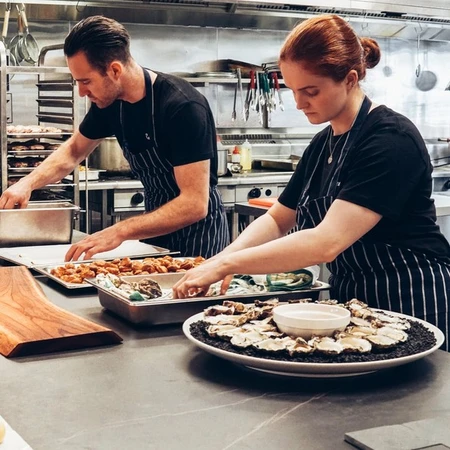
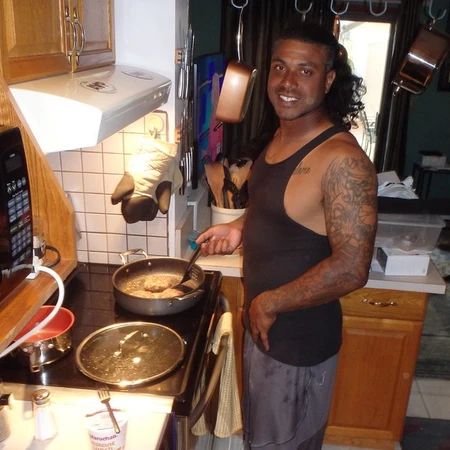
Candidate B, here are your pictures. They show people cooking. Compare the two pictures and say how experienced they might be at what they do, okay? (1 minute)
Candidate B: The left picture shows professional cooks making some elaborate dishes in a spacious kitchen of a restaurant or café. The second picture, on the other hand, shows an apartment with a man cooking a much simpler meal.
Even though the people in the first picture are more likely to have more experience dealing with food, this is not necessarily true. They could only be trainees; both of them look rather young. The man in the second picture looks about the same age, but he might have more years of cooking under his belt, so you never know!
Candidate A, who does the cooking in your family? (~20 seconds)
Candidate: My wife does it, thankfully. I’m hopeless at cooking; anything more complex than frying some eggs or boiling a sausage is way too much for me. I realise that it’s one of the best skills to have, so I will probably try to deal with this shortcoming of mine in the future.
Spacious (adj) – having a lot of free room – as the word suggests, it is used with spaces, both inside and outside.
Under his belt – the expression is used to say that somebody has experience in the matter, e.g. “Jonathan has four years of professional skiing under his belt”.
Hopeless at – be very bad at doing something, can often be used humorously or ironically.
Shortcoming – a negative side of a thing or person.
#8. Animals, free and captive; Transport


Candidate A, here are your photographs. They show wild animals in different environments. I’d like you to compare the photographs and say how comfortable the animals might be in both environments. (1 minute)
Candidate A: The picture on the left shows a cheetah trapped in a cage, probably in a zoo, whereas the right image has zebras grazing on a pasture somewhere in savannah. The principal difference between the pictures is that one shows animals in their natural habitat, while the other has an animal held against its will in confinement.
It is difficult to speculate whether the caged animal is hugely discomforted by its conditions. Maybe it has a very spacious cage and carefully selected food, with the caretakers doing their best to ensure the best possible condition for the predator. Contrastingly, the zebras could be struggling to find enough food, as it is a well known fact that many African species are suffering from deforestation and loss of habitat.
Candidate B, in which environment the animals are likely to live longer? (~20 seconds).
Candidate B: It might sound absurd, but I firmly believe that animals in zoos have more chance of living longer as they are not threatened by poachers, natural phenomenon and predators. Of course cheetah has no animals that could pose a threat to them, but human factor is still too big to ignore.
Grazing on a pasture – grazing means eating grass and a pasture is the place that is dedicated to letting animals like cows feed on grass.
Principal (adj) – main, primary.
Natural habitat – the place and climate where an animal lives because it finds it most comfortable.
Against its will in confinement – confinement is a state of having one’s freedom of movement limited, such as in a prison or a cage.
It’s difficult to speculate – a useful phrase to introduce a speculative statement.
With – a notable thing about this word here is that it works as a conjunction, connecting several clauses in the sentence.
Contrastingly (adv) – an adverb that aids in showing some difference between the two pictures.
Threatened by poachers – poachers are hunters who break the law killing animals that are protected by the government.

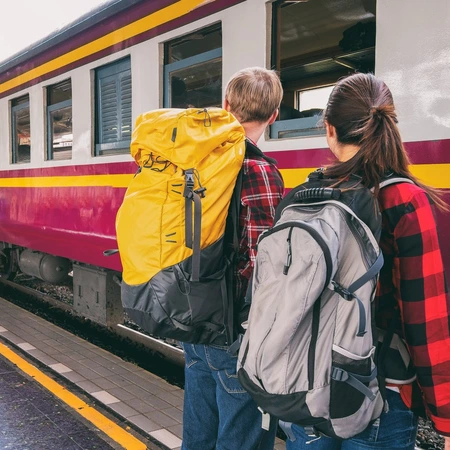
Candidate B, now it’s your turn. These pictures show people and public transport. Compare the photographs and say how comfortable each type of transport might be. (1 minute)
Candidate B: In the first picture, there is a group of people waiting for their turn to board a plane using a ramp. The other photo shows us a couple of people with backpacks standing at a train platform as they are about to get on the train car. While both pictures show various types of transportation, planes are more commonly associated with long-distance travel, so the people in the picture are probably going to a different country or even a different continent. Contrastingly, trains are usually chosen for shorter journeys.
I guess both kinds of transport can be comfortable, although admittedly people in the first picture seem way less comfortable as they have to stand in a crowd with bags, waiting for their turn to come onboard.
Candidate A, which type of public transport you would prefer, and why?
Candidate A: I would probably stick to trains, even if it means spending more time en route. There is something sentimental about sitting by a train window, looking at the landscape rushing past. You feel less confined in a train because it makes stops so you could go out to stretch your legs. Also, you have the option to open a window, which is out of the question on a plane!
Admittedly (adv) – used when you want to state something that you are unwilling to or because the statement might be unpleasant to the listener.
Seem way less comfortable – use ‘seem’ to introduce another level of being unsure or not certain. ‘Way less’ is another phrase with a similar meaning to ‘much less’, but more informal.
Stick to – if you stick to something, it means you make the same choice again and again, e.g. “I usually stick to the same route when I walk home from work”
Confined – (here) stuck somewhere with no way out.
Out of the question – if something is out of the question, then it absolutely can’t or shouldn’t be done.
#9. Places to live in; New heights
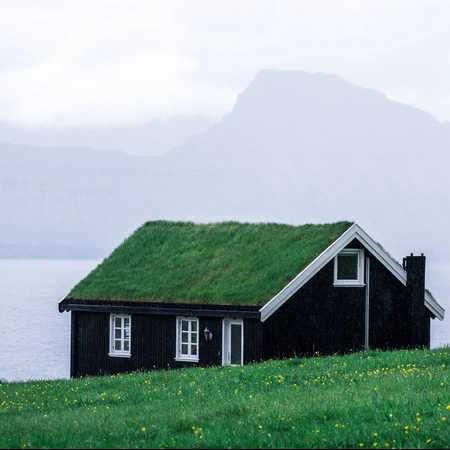
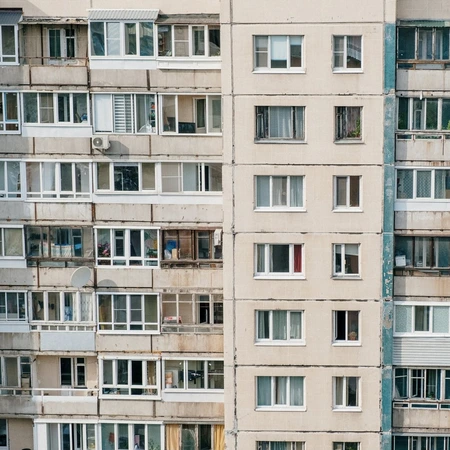
Candidate A, here are your pictures. They show different places people live in. I’d like you to compare the photographs and say why people might prefer to live there. (1 minute)
Candidate A: Picture one shows a detached house situated in a remote location on the shore of a foggy lake or river, whereas the other one shows a rather depressing view of a block of flats. Even the colours of the pictures give different emotions – serenity and contemplation for the first one and melancholy for the other.
Apartment blocks are a common choice for the majority as they provide accessible housing for urban citizens. They are conveniently located in the city to allow shorter commute times to their places of work, and this aspect alone makes them so preferred by those employed at a full-time job. Contrastingly, private housing like in the first picture is usually too expensive to afford if it is located in the city because the cost of land can be quite high. That is why this type of lodging is usually found in the county.
Candidate B, which place would be more comfortable to live in for a big family? (~20 seconds).
Candidate B: When we talk about families, we probably imagine a husband and a wife with several kids – and kids have to be taken to places. Whether it’s the kindergarten, the school or the hospital, all of these are much more likely to be immediately accessible in a city. The first picture is clearly away from a busy urban area, which is why I think the second picture shows better accommodation for a family, even if it might not look like much.
Whereas (adv) – a good verb to make a contrasting comparison with a previously mentioned thing. This one comes in the second part of the same sentence as the first thing, e.g. “Oranges are normally sweet, whereas lemons are almost always bitter”.
Conveniently located – located in a way that is practical and easily accessible.
Lodging – place of living, accommodation.
Immediately accessible – easy to get to.


Candidate B, now it’s your turn. The pictures show people at high altitudes. Compare both pictures and say what could have made these people go there. (1 minute)
Candidate B: The first picture shows us a man who has just finished his ascension to a mountain peak, his hands held high in celebration of this achievement. The place looks cold but the man probably doesn’t feel it from all the climbing he had to do. The other one is a nice show of a couple, holding hands and looking down on a beautiful urban skyline from some high point just outside that city.
The purpose of going that high could be different – the couple probably wanted to admire the view, do something romantic together, or maybe just have a pleasant change from the more usual activities like going to the restaurant or the movies. The man in the wilderness of the mountains is likely to have done that for a different reason. Maybe he wanted to prove something to himself – that he is strong and brave enough to reach the peak all by himself.
Candidate A, which picture shows a situation that is more likely to be memorable?
Candidate A: Climbing up a dangerous mountain is very unusual, and for that reason alone, it is going to be a memory to go back to. However, the second picture is not to be discounted either. It could also be their very first time together, which is naturally going to stick in their minds – then I would say the situation in picture two is going to be quite memorable.
Urban skyline – the overall impression of the city where you can see most of it from a distance.
Probably (adv) – show a degree of uncertainty with this adverb.
Likely (adv) – same as before, you cannot be sure about what is going on in the picture, so speculating makes sense.
All by himself – alone, without other people.
Not to be discounted – should not be seen or considered unimportant.
Stick in one’s mind – to be memorable, to leave a lasting impression.
#10. People with animals; Live performances

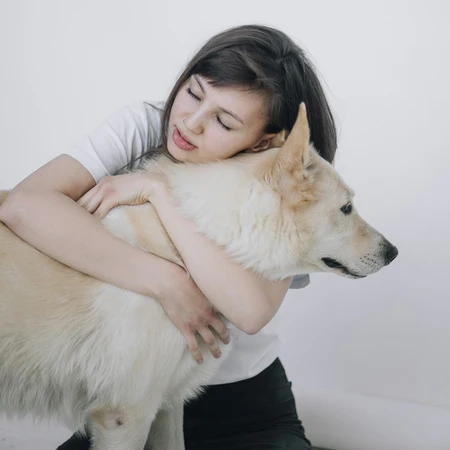
Candidate A, here are your pictures. They show people with animals. I’d like you to compare the pictures and say what each person’s attitude to the animals might be, okay? (1 minute)
Candidate A: The first picture is of a woman standing in front of a floor-to-ceiling aquarium with lots of sea life in it. The other picture is a close-up of a young girl who is affectionately embracing a dog. It could be her pet that she is parting with, or maybe she hasn’t seen it for a long time.
It is clear that the girl in the second picture has great fondness for her dog, her body language is an indication of that. Conversely, the woman in the other image shows curiosity, but probably nothing beyond that.
Candidate B, are animals an important part of your life? (~20 seconds).
Candidate B: I do have a cat at my home. She is the only living thing that is always with me, so I would say yes, she is of vital importance to me. I don’t think my life would be the same if I didn’t have my cat, for whatever reason.
Embrace (v) – to hug.
Conversely (adv) – we are introducing a counterpoint here.
I do have … – some people are unaware that you can use auxiliary verbs in affirmative (positive) sentences to make them more emphatic (carry more meaning, make them sound more convincing).
Would be – introducing an imaginary or hypothetical situation with ‘would’ is a good idea and a way to speculate.

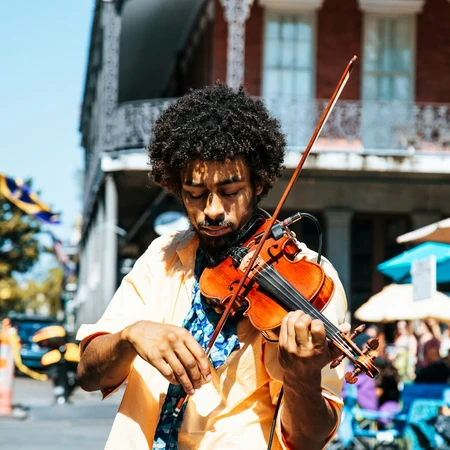
Candidate B, now it’s your turn. The pictures show people playing music. Compare both pictures and say which musician enjoys their job more. (1 minute)
Candidate B: While both pictures show live music performances, there are certain differences between them. The first one displays a huge concert hall, an expensive show that has gathered thousands of people around it. In the second image, we see a street performer playing the violin for whoever happens to pass by him.
It is difficult to say which musician is driven by passion for their craft and who does it simply as an alternative to a day job. I will take a wild guess here and say that the performers of the live concert are more likely to derive pleasure from what they do. I think so because they have so many people who appreciate their work – this alone should be enough to make your passion worth pursuing.
Candidate A, music in which picture would you prefer to listen to?
Candidate A: I am not a big fan of string instruments, so listening to the violin would not be very enjoyable to me. That is why I would go for the music playing at that big event – it is probably some electronic dance music or something of the kind. I am just not into older instruments like the violin, that is all.
For whoever happens to pass by him – use ‘whoever’ when there is no need to specify the person. To pass by means to walk close without stopping.
Take a wild guess – a great way to introduce a speculative statement.
Derive pleasure from something – to enjoy some activity.
Worth pursuing – here, to pursue something means to continue doing it.
 Click to download this FCE Speaking Part 2 Worksheet in PDF. There is also a version with question cards only, without model answers or vocabulary.
Click to download this FCE Speaking Part 2 Worksheet in PDF. There is also a version with question cards only, without model answers or vocabulary.

